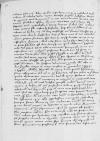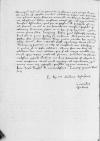Non ita sum impudens, ut te in rescribendi vicisitudine ad calculos velim vocare, Dantisce, praesulum doctissime. Neque ita ignarus rerum humanarum, ut non animadvertam quantis negotiorum fluctibus assidue obruaris. Tum vero, etsi maxime tibi suppetat otium, improbissimum tamen ducerem, si illud etiam melioris notae amicus sibi impendi postulet. Itaque plurimum falleris, si ita iudicas, ut scribis, me non boni consuluisse tuum silentium, quippe qui votis meis abunde satisfactum duco, si litteris meis ad Tuam Celsitudinem aditum patere sentiam. Cum vero te eousque demittis, ut eas etiam responsione digneris, illud mihi plane accidit supra votum, idque ego in parte felicitatis esse duco, hucusque me apud celeberrimum caesareae aulae vel potius totius orbis ornamentum promovisse, ut me tua responsione non indignum existimes. Proinde sive tibi sponte in mentem venit, sive alius quispiam suggessit, a me officium tuum vel accusari, vel etiam requiri, obsecro te per Charites (Gratiae), in Greek mythology goddesses of charm and beauty⌊GratiasCharites (Gratiae), in Greek mythology goddesses of charm and beauty⌋ et Muses Greek goddesses of literature and the arts⌊MusasMuses Greek goddesses of literature and the arts⌋, ne me credas comississe id, quod sine summo piaculo me certo scio non posse committere. De Cornelis De Schepper (Cornelius Scepperus, Cornelis De Dobbele, Cornelius Duplicius) (*1503 – †1555), erudite, diplomat in the Habsburgs' service; close friend of Ioannes Dantiscus; initially in the service of Christian II of Oldenburg, King of Denmark; 1526 secretary and councillor to Emperor Charles V of Habsburg (CE, vol. 3, p. 218-220; DE VOCHT 1961, p. 15-24)⌊ScepperoCornelis De Schepper (Cornelius Scepperus, Cornelis De Dobbele, Cornelius Duplicius) (*1503 – †1555), erudite, diplomat in the Habsburgs' service; close friend of Ioannes Dantiscus; initially in the service of Christian II of Oldenburg, King of Denmark; 1526 secretary and councillor to Emperor Charles V of Habsburg (CE, vol. 3, p. 218-220; DE VOCHT 1961, p. 15-24)⌋ vehementer gaudeo illum nobis in dies singulos magis ac magis crescere ac gravioribus negotiis a Charles V of Habsburg (*1500 – †1558), ruler of the Burgundian territories (1506-1555), King of Spain as Charles I (1516-1556), King of Naples and Sicily, King of the Romans (1519-1530), Holy Roman Emperor of the German Nation (elected 1519, crowned 1530, abdicated 1556); son of Philip I the Handsome and Joanna the Mad of Castile⌊caesareCharles V of Habsburg (*1500 – †1558), ruler of the Burgundian territories (1506-1555), King of Spain as Charles I (1516-1556), King of Naples and Sicily, King of the Romans (1519-1530), Holy Roman Emperor of the German Nation (elected 1519, crowned 1530, abdicated 1556); son of Philip I the Handsome and Joanna the Mad of Castile⌋ adhiberi. Meretur illa ingenii divina
quaedam felicitas, ut summa adsequatur, sed ad ea non patet via, nisi per ardua ac sudores, quibus dii virtutem munierunt. Sed illi tamen faciliores aditus auguramur, quod eum monitorem ac magistrum in moderanda vita nactus sit, qui non modo Odysseus (Ulysses, Ulixes), mythical Greek king of Ithaca, hero of the Homer's epic poems Ilias and Odyssey, renown of his sagacity and cunning⌊UlyssisOdysseus (Ulysses, Ulixes), mythical Greek king of Ithaca, hero of the Homer's epic poems Ilias and Odyssey, renown of his sagacity and cunning⌋ exemplo multorum hominum mores cognorit et urbes, sed etiam perspectum habeat, quicquid ubique vel expetendum, vel fugiendum, quique non minus certo possit praescribere novum istud iter ingredienti, quae sit optima inter proceres vivendi ratio, quam Circe in Greek mythology a minor goddess of magic, living on the island of Aeaea⌊CirceCirce in Greek mythology a minor goddess of magic, living on the island of Aeaea⌋ illa Homerica inter Scylla mythological monster that lived on one side of a narrow channel of water, opposite Charybdis, and devoured sailors⌊ScyllamScylla mythological monster that lived on one side of a narrow channel of water, opposite Charybdis, and devoured sailors⌋ et Charybdis (Kharybdis), mythological sea monster that lived on one side of a narrow channel of water, opposite Scylla⌊CharibdimCharybdis (Kharybdis), mythological sea monster that lived on one side of a narrow channel of water, opposite Scylla⌋, in minimo leti discrimine, quae esset expeditissima navigatio. Scio illum praecipuo favore Mercurino Arborio di Gattinara (*1465 – †1530), humanist, jurist, trusted and influential advisor to Charles V; 1501 entered the service of the Habsburgs as legal counsel to Duchess Margaret of Austria, 1504 advisor and President of the Privy Council of Margaret of Austria, after the governoship of the Netherlands was entrusted to her, 1518 Grand Chancellor of Castile and later of Charles V as Roman Emperor, 1529 Cardinal of St. Giovanni a Porta Latina (after the death of his wife, Andreetta Avogadro) (DE VOCHT 1961, p. 12; CE, vol. 2, p. 76-80)⌊MercuriniMercurino Arborio di Gattinara (*1465 – †1530), humanist, jurist, trusted and influential advisor to Charles V; 1501 entered the service of the Habsburgs as legal counsel to Duchess Margaret of Austria, 1504 advisor and President of the Privy Council of Margaret of Austria, after the governoship of the Netherlands was entrusted to her, 1518 Grand Chancellor of Castile and later of Charles V as Roman Emperor, 1529 Cardinal of St. Giovanni a Porta Latina (after the death of his wife, Andreetta Avogadro) (DE VOCHT 1961, p. 12; CE, vol. 2, p. 76-80)⌋ non mediocriter evectum, sed tamen quod eius divinum ingenium et dexteritas in agendis rebus Mercurino Arborio di Gattinara (*1465 – †1530), humanist, jurist, trusted and influential advisor to Charles V; 1501 entered the service of the Habsburgs as legal counsel to Duchess Margaret of Austria, 1504 advisor and President of the Privy Council of Margaret of Austria, after the governoship of the Netherlands was entrusted to her, 1518 Grand Chancellor of Castile and later of Charles V as Roman Emperor, 1529 Cardinal of St. Giovanni a Porta Latina (after the death of his wife, Andreetta Avogadro) (DE VOCHT 1961, p. 12; CE, vol. 2, p. 76-80)⌊MercurinoMercurino Arborio di Gattinara (*1465 – †1530), humanist, jurist, trusted and influential advisor to Charles V; 1501 entered the service of the Habsburgs as legal counsel to Duchess Margaret of Austria, 1504 advisor and President of the Privy Council of Margaret of Austria, after the governoship of the Netherlands was entrusted to her, 1518 Grand Chancellor of Castile and later of Charles V as Roman Emperor, 1529 Cardinal of St. Giovanni a Porta Latina (after the death of his wife, Andreetta Avogadro) (DE VOCHT 1961, p. 12; CE, vol. 2, p. 76-80)⌋ innotuerunt, id ego saepenumero apud me cogitans tibi praecipue soleo acceptum referre. Cum tu unus sis inter tot purpuratos omnium iudicio, qui virtutem neque natalibus, neque fortunae apparatu, sed sua ipsius mercede ac dignitate metiaris. Quae cum in Cornelis De Schepper (Cornelius Scepperus, Cornelis De Dobbele, Cornelius Duplicius) (*1503 – †1555), erudite, diplomat in the Habsburgs' service; close friend of Ioannes Dantiscus; initially in the service of Christian II of Oldenburg, King of Denmark; 1526 secretary and councillor to Emperor Charles V of Habsburg (CE, vol. 3, p. 218-220; DE VOCHT 1961, p. 15-24)⌊ScepperoCornelis De Schepper (Cornelius Scepperus, Cornelis De Dobbele, Cornelius Duplicius) (*1503 – †1555), erudite, diplomat in the Habsburgs' service; close friend of Ioannes Dantiscus; initially in the service of Christian II of Oldenburg, King of Denmark; 1526 secretary and councillor to Emperor Charles V of Habsburg (CE, vol. 3, p. 218-220; DE VOCHT 1961, p. 15-24)⌋ sit eximia certam animo spem favemus illum aliquando ad summa perventurum, praesertim si aura favoris tui non destituatur.
 UUB, H. 154, f. 52v
Quamquam etiam nunc eo pervenit, ut fortuna eius magis obnoxia sit invidiae, quam exsposita aemulorum imitationi, ceterum cum ipse Cornelis De Schepper (Cornelius Scepperus, Cornelis De Dobbele, Cornelius Duplicius) (*1503 – †1555), erudite, diplomat in the Habsburgs' service; close friend of Ioannes Dantiscus; initially in the service of Christian II of Oldenburg, King of Denmark; 1526 secretary and councillor to Emperor Charles V of Habsburg (CE, vol. 3, p. 218-220; DE VOCHT 1961, p. 15-24)⌊ScepperumCornelis De Schepper (Cornelius Scepperus, Cornelis De Dobbele, Cornelius Duplicius) (*1503 – †1555), erudite, diplomat in the Habsburgs' service; close friend of Ioannes Dantiscus; initially in the service of Christian II of Oldenburg, King of Denmark; 1526 secretary and councillor to Emperor Charles V of Habsburg (CE, vol. 3, p. 218-220; DE VOCHT 1961, p. 15-24)⌋ plurimis annis fraterno animo sim complexus, hoc ipso nomine me tibi plurimum debere confiteor necesse est, nisi ingratus velim beneficium dissimulare, quod per te potissimum illi patefacta est via ad fortunam, et nunc in tua benevolentia certissimum praesidium illi collocatum. Fortunent superi, ut in hac quoque legatione Charles V of Habsburg (*1500 – †1558), ruler of the Burgundian territories (1506-1555), King of Spain as Charles I (1516-1556), King of Naples and Sicily, King of the Romans (1519-1530), Holy Roman Emperor of the German Nation (elected 1519, crowned 1530, abdicated 1556); son of Philip I the Handsome and Joanna the Mad of Castile⌊caesarisCharles V of Habsburg (*1500 – †1558), ruler of the Burgundian territories (1506-1555), King of Spain as Charles I (1516-1556), King of Naples and Sicily, King of the Romans (1519-1530), Holy Roman Emperor of the German Nation (elected 1519, crowned 1530, abdicated 1556); son of Philip I the Handsome and Joanna the Mad of Castile⌋ animo faciat satis. Imaginem Erasmus of Rotterdam (Gerrit Gerritszoon, Geert Geerts, Desiderius Erasmus Roterodamus) (*1466/1469 – †1536), Dutch humanist and theologian, distinguished philologist, the most famous and influential humanist of the Northern Renaissance; his works had a profound impact upon Christian theology during the first half of the sixteenth century⌊ErasmiErasmus of Rotterdam (Gerrit Gerritszoon, Geert Geerts, Desiderius Erasmus Roterodamus) (*1466/1469 – †1536), Dutch humanist and theologian, distinguished philologist, the most famous and influential humanist of the Northern Renaissance; his works had a profound impact upon Christian theology during the first half of the sixteenth century⌋, quod destinasti remittere haud scio, in quam partem sit accipiendum. Illud tamen scito, mihi posthac fore iniucundissimum, nam quoties intuebor, haec cogitatio subibit animum, illam a Dantisco fuisse repudiatam. Quod ad meam oblectationem pertinet, ea mihi est necessitudo cum Hans Holbein the Younger (*ca. 1497 – †1543), German painter⌊HoelpeynoHans Holbein the Younger (*ca. 1497 – †1543), German painter⌋, ut quidvis ab eo possim impetrare. Quin spero me brevi tibi exhibiturum hoc anno effictam, quae si tibi magis accidebit, tum tua sit optio utram malis tibi servare. Simulacrum tui plumbeum avidissime exspecto. Puderet me huius petacitatis, si aliunde liceret comparare. Quod cum sit negatum, ab impudentia, quam tamen amor tui expressit, praesidium cogimur mutuare.
UUB, H. 154, f. 52v
Quamquam etiam nunc eo pervenit, ut fortuna eius magis obnoxia sit invidiae, quam exsposita aemulorum imitationi, ceterum cum ipse Cornelis De Schepper (Cornelius Scepperus, Cornelis De Dobbele, Cornelius Duplicius) (*1503 – †1555), erudite, diplomat in the Habsburgs' service; close friend of Ioannes Dantiscus; initially in the service of Christian II of Oldenburg, King of Denmark; 1526 secretary and councillor to Emperor Charles V of Habsburg (CE, vol. 3, p. 218-220; DE VOCHT 1961, p. 15-24)⌊ScepperumCornelis De Schepper (Cornelius Scepperus, Cornelis De Dobbele, Cornelius Duplicius) (*1503 – †1555), erudite, diplomat in the Habsburgs' service; close friend of Ioannes Dantiscus; initially in the service of Christian II of Oldenburg, King of Denmark; 1526 secretary and councillor to Emperor Charles V of Habsburg (CE, vol. 3, p. 218-220; DE VOCHT 1961, p. 15-24)⌋ plurimis annis fraterno animo sim complexus, hoc ipso nomine me tibi plurimum debere confiteor necesse est, nisi ingratus velim beneficium dissimulare, quod per te potissimum illi patefacta est via ad fortunam, et nunc in tua benevolentia certissimum praesidium illi collocatum. Fortunent superi, ut in hac quoque legatione Charles V of Habsburg (*1500 – †1558), ruler of the Burgundian territories (1506-1555), King of Spain as Charles I (1516-1556), King of Naples and Sicily, King of the Romans (1519-1530), Holy Roman Emperor of the German Nation (elected 1519, crowned 1530, abdicated 1556); son of Philip I the Handsome and Joanna the Mad of Castile⌊caesarisCharles V of Habsburg (*1500 – †1558), ruler of the Burgundian territories (1506-1555), King of Spain as Charles I (1516-1556), King of Naples and Sicily, King of the Romans (1519-1530), Holy Roman Emperor of the German Nation (elected 1519, crowned 1530, abdicated 1556); son of Philip I the Handsome and Joanna the Mad of Castile⌋ animo faciat satis. Imaginem Erasmus of Rotterdam (Gerrit Gerritszoon, Geert Geerts, Desiderius Erasmus Roterodamus) (*1466/1469 – †1536), Dutch humanist and theologian, distinguished philologist, the most famous and influential humanist of the Northern Renaissance; his works had a profound impact upon Christian theology during the first half of the sixteenth century⌊ErasmiErasmus of Rotterdam (Gerrit Gerritszoon, Geert Geerts, Desiderius Erasmus Roterodamus) (*1466/1469 – †1536), Dutch humanist and theologian, distinguished philologist, the most famous and influential humanist of the Northern Renaissance; his works had a profound impact upon Christian theology during the first half of the sixteenth century⌋, quod destinasti remittere haud scio, in quam partem sit accipiendum. Illud tamen scito, mihi posthac fore iniucundissimum, nam quoties intuebor, haec cogitatio subibit animum, illam a Dantisco fuisse repudiatam. Quod ad meam oblectationem pertinet, ea mihi est necessitudo cum Hans Holbein the Younger (*ca. 1497 – †1543), German painter⌊HoelpeynoHans Holbein the Younger (*ca. 1497 – †1543), German painter⌋, ut quidvis ab eo possim impetrare. Quin spero me brevi tibi exhibiturum hoc anno effictam, quae si tibi magis accidebit, tum tua sit optio utram malis tibi servare. Simulacrum tui plumbeum avidissime exspecto. Puderet me huius petacitatis, si aliunde liceret comparare. Quod cum sit negatum, ab impudentia, quam tamen amor tui expressit, praesidium cogimur mutuare.
Bene vale Praesul Reverendissime.
 UUB, H. 154, f. 52v
Quamquam etiam nunc eo pervenit, ut fortuna eius magis obnoxia sit invidiae, quam exsposita aemulorum imitationi, ceterum cum ipse
UUB, H. 154, f. 52v
Quamquam etiam nunc eo pervenit, ut fortuna eius magis obnoxia sit invidiae, quam exsposita aemulorum imitationi, ceterum cum ipse 

